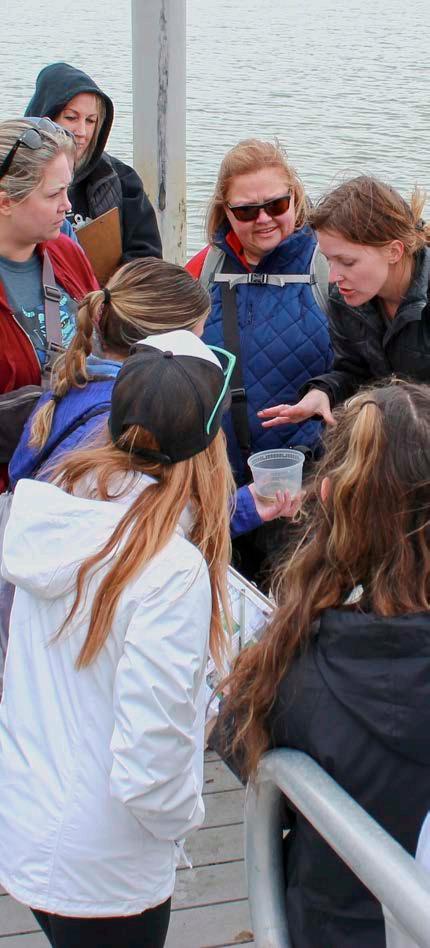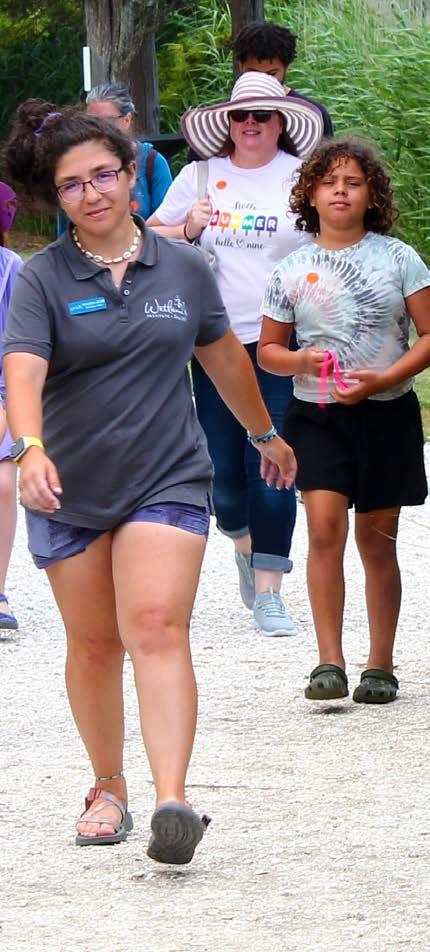



A Year of TWI Impact 2024 Impact Snapshot






A Year of TWI Impact 2024 Impact Snapshot

The Wetlands Institute is a distinctive organization that intentionally marries research, conservation and education under one mission umbrella. From our humble beginnings to today’s world-class organization, creating connections to community has been at the heart of all we do. I see it as a series of overlapping concentric circles with the power to advance innovative science, put the results of this work into responsive conservation practice, and immersing people across the entire spectrum of engagement.
For some, the journey begins with our pioneering applied research to solve today’s complex environmental problems spanning the impacts of climate change on our foundational wetland ecosystems to the keystone wildlife that depend on them, this circle encompasses strong partnerships with federal and state natural resource agencies, universities and fellow not-for-profit organizations. It bridges actionable on-the-ground projects with driving policy changes that create ripple effects and advance this work on a national scale. For others, their awareness and inclusion come through participation in the ethics of conservation stewardship. Like the Individuals who take that simple step of slowing down on area roadways to give diamondback terrapins seeking ever vanishing nesting locations a break. Or those that are all in and are trained to lead stewardship walks in the dark of night to rescue thousands of horseshoe crabs from Delaware Bay beaches are part of a remarkable community-based conservation program that has repeatedly garnered national attention for its impact. And for some, their inclusion in this community of caring comes from visiting and participating in a guided walk and leaning more about the wonders of these places and how every stewardship step matters.
There are so many ways that The Wetlands Institute’s work, programs, and the opportunities we provide collectively build a community of caring and stewardship. It’s magical, and the most incredible part is that everyone can be a part of it. TWI is a welcoming place that is just waiting for you to be a part of the community of education, research, conservation, and caring that brings lifelong enrichment to all that join us.

For several years, The Wetlands Institute (TWI) has partnered with the NJDEP and US Army Corps of Engineers to enhance coastal resilience using dredged sediments from navigation maintenance of New Jersey's Intracoastal Waterway. Through the Seven Mile Island Innovation Lab, TWI and our partners have implemented nine projects that have restored over 100 acres of marsh and mitigated marsh loss due to rising seas. Notably, the Scotch Bonnet Marsh Enhancement Project, completed in fall 2024, stabilized marshes adjacent to our marsh campus and lifted elevation to support healthy growth while offsetting sea level rise and conferring added benefits of coastal resilience to TWI.
TWI is now planning a second project to raise the Salt Marsh Trail elevation, restore several more acres of marsh, and create habitats for nesting diamondback terrapins and marsh-dependent birds.
The Salt Marsh Trail is vital for our mission, offering accessibility to Scotch Bonnet Creek, the dock, and the boathouse. It enables visitors of all ages to explore the marsh and supports our research efforts. The trail also serves sensitive wildlife, providing critical habitats for various bird species and diamondback terrapins.
Originally built in the late 1950s, the trail has faced increasing flooding, impacting access and damaging habitats. To address this, we plan to raise the trail’s elevation by two to three feet, enhance educational opportunities, and create new habitats for nesting. The project will also include a new, modest boathouse and replanting with native species, ultimately providing resilience against storm waves and further protecting our campus. When combined with the Scotch Bonnet Marsh Enhancement Project, we will have added storm protections from wave attack from both the south and east, the primary vulnerabilities for our marsh campus.


More than 13,400 children and young adults participated in formal education programs with The Wetlands Institute
kids participated in Summer Nature Programs
636 3,521 3,113 1,430 880 3,345
youth explored the ocean on 10 SEAS trips in the waters off of Wildwood Crest
students from 80 schools visited the wetlands for field trips
learners from 29 schools had a traveling education program visit their classroom
students experienced multi-engagement education programs including all children in grades K-9 from Ocean City Schools, and all children in grades K-8 from Avalon and Stone Harbor Elementary Schools. homeschoolers, scouts and local youth organizations enjoyed customized environmental education programming. participants experienced interactive group outreach programs
• 63 overnight participants in 7 programs
• 269 participants in Nature Education for Homeschool Students and Teachers
• 548 scout or homeschool private program participants in 46 programs


Each year, nearly 1,300 children in grades K-9 from Ocean City Schools participate in more than 110 environmental education programs ranging from aquariums in the classroom to sustainable seafood and beach and wetland explorations. All programs are grade-level specific, emphasize place-based education, and allow students to explore and understand the surrounding South Jersey ecosystems they call home. By learning about local wildlife, conducting water tests, and understanding the importance of sustainability, these young learners are not just participants—they are becoming passionate environmental stewards. This longstanding partnership, funded by the Ocean City Library, is inspiring the next generation to care for and protect our vital natural resources.
TWI launched a new partnership with Stockton University’s Climate Change Learning Collaborative to provide K-12 educators with place-based climate change professional development workshops that support them in the implementation of the NJ Student Learning Standards in Climate Change into their curriculum.

“It’s great that the kids can get down and touch their natural world that their discoveries lead the lesson and that they are exposed to the idea of conservation. Thank you!”
New Jersey’s protected species face growing threats from habitat loss and human activity, requiring targeted, long-term conservation efforts. The Research and Conservation Department focuses on species like diamondback terrapins, Eastern box turtles, black skimmers, other colonial beach nesting and wading birds, and American oystercatchers, supporting them through research, habitat protection, and threat mitigation.
Coastal development has severely impacted diamondback terrapin nesting sites. Many now nest along roadsides, resulting in thousands of terrapin deaths annually. Adult survival is crucial to sustaining populations because females take 6–8 years to mature and have low offspring survival rates. In 2024, staff and volunteers saved a record 1,171 terrapins. 88 injured turtles were treated, and 617 eggs were recovered for incubation.
A major milestone in 2024 was expanding our animal movement research. With five coastal species tagged with transmitters, we’re identifying vital habitats and corridors, helping to shape new conservation strategies. Insights from our prior telemetry study on terrapins were published in a peer-reviewed paper, advancing our understanding of habitat use.
We also launched a Story Map, The Delaware Bay American Oystercatcher Project, in partnership with the Conserve Wildlife Foundation of NJ. This interactive resource highlights our research on this understudied species, outlines threats, and shares data to support conservation efforts.
These projects exemplify how research can guide action where it’s needed most.



We trained 164 volunteers for the reTURN the Favor program in support of horseshoe crab and shorebird recovery on the Delaware Bay. Together, we saved 135,897 horseshoe crabs on 19 beaches during 2,569 hours of volunteer effort. Our staff were interviewed for several media stories covering the inspiring story of reTURN the Favor and the plight of horseshoe crabs that aired on national (CBS Sunday Morning) and regional (NBC News New York and Philadelphia) news programs.
Our Shorebird Steward Program had our highest public engagement year yet. Between Stone Harbor Point and Cape May National Wildlife Refuge Two Mile Beach Unit, 5,476 people were engaged with educational information on sharing the beaches with beach nesting birds and also worked to limit disturbance to a productive Black Skimmer colony at the end of Stone Harbor Point.


2024 Revenue ($2.9M)
Grants Funding: $136,035
Gifts/Memberships: $1,941,516
Program Income: $541,276
Invested Funds: $315,658
Putting Funds to Work
Program Services: 76% Administrative: 15% Fundraising: 9%

A group of K-12 educators spent the day at TWI for place based workshops that support them in the implementation of the NJ Student Learning Standards in Climate Change into their curriculum.